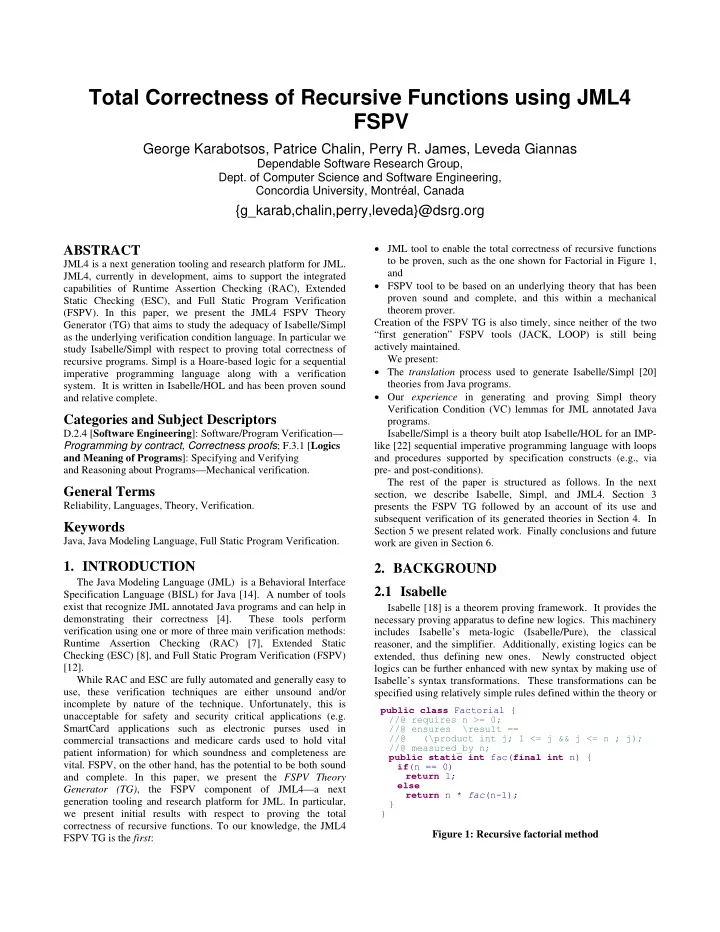

Total Correctness of Recursive Functions using JML4 FSPV George Karabotsos, Patrice Chalin, Perry R. James, Leveda Giannas Dependable Software Research Group, Dept. of Computer Science and Software Engineering, Concordia University, Montréal, Canada {g_karab,chalin,perry,leveda}@dsrg.org • JML tool to enable the total correctness of recursive functions ABSTRACT to be proven, such as the one shown for Factorial in Figure 1, JML4 is a next generation tooling and research platform for JML. and JML4, currently in development, aims to support the integrated • FSPV tool to be based on an underlying theory that has been capabilities of Runtime Assertion Checking (RAC), Extended proven sound and complete, and this within a mechanical Static Checking (ESC), and Full Static Program Verification theorem prover. (FSPV). In this paper, we present the JML4 FSPV Theory Creation of the FSPV TG is also timely, since neither of the two Generator (TG) that aims to study the adequacy of Isabelle/Simpl “first generation” FSPV tools (JACK, LOOP) is still being as the underlying verification condition language. In particular we actively maintained. study Isabelle/Simpl with respect to proving total correctness of We present: recursive programs. Simpl is a Hoare-based logic for a sequential • The translation process used to generate Isabelle/Simpl [20] imperative programming language along with a verification theories from Java programs. system. It is written in Isabelle/HOL and has been proven sound • Our experience in generating and proving Simpl theory and relative complete. Verification Condition (VC) lemmas for JML annotated Java Categories and Subject Descriptors programs. D.2.4 [ Software Engineering ]: Software/Program Verification— Isabelle/Simpl is a theory built atop Isabelle/HOL for an IMP- Programming by contract, Correctness proofs ; F.3.1 [ Logics like [22] sequential imperative programming language with loops and Meaning of Programs ]: Specifying and Verifying and procedures supported by specification constructs (e.g., via and Reasoning about Programs—Mechanical verification. pre- and post-conditions). The rest of the paper is structured as follows. In the next General Terms section, we describe Isabelle, Simpl, and JML4. Section 3 Reliability, Languages, Theory, Verification. presents the FSPV TG followed by an account of its use and subsequent verification of its generated theories in Section 4. In Keywords Section 5 we present related work. Finally conclusions and future Java, Java Modeling Language, Full Static Program Verification. work are given in Section 6. 1. INTRODUCTION 2. BACKGROUND The Java Modeling Language (JML) is a Behavioral Interface 2.1 Isabelle Specification Language (BISL) for Java [14]. A number of tools exist that recognize JML annotated Java programs and can help in Isabelle [18] is a theorem proving framework. It provides the demonstrating their correctness [4]. These tools perform necessary proving apparatus to define new logics. This machinery verification using one or more of three main verification methods: includes Isabelle’s meta-logic (Isabelle/Pure), the classical Runtime Assertion Checking (RAC) [7], Extended Static reasoner, and the simplifier. Additionally, existing logics can be Checking (ESC) [8], and Full Static Program Verification (FSPV) extended, thus defining new ones. Newly constructed object [12]. logics can be further enhanced with new syntax by making use of While RAC and ESC are fully automated and generally easy to Isabelle’s syntax transformations. These transformations can be use, these verification techniques are either unsound and/or specified using relatively simple rules defined within the theory or incomplete by nature of the technique. Unfortunately, this is public class Factorial { unacceptable for safety and security critical applications (e.g. //@ requires n >= 0; SmartCard applications such as electronic purses used in //@ ensures \result == //@ (\product int j; 1 <= j && j <= n ; j); commercial transactions and medicare cards used to hold vital //@ me sured_ y n a b ; patient information) for which soundness and completeness are public static int fac( final int n) { vital. FSPV, on the other hand, has the potential to be both sound if (n == 0) ret urn 1; and complete. In this paper, we present the FSPV Theory else Generator (TG) , the FSPV component of JML4—a next return n * fac (n-1); generation tooling and research platform for JML. In particular, } we present initial results with respect to proving the total } correctness of recursive functions. To our knowledge, the JML4 Figure 1: Recursive factorial method FSPV TG is the first :
Recommend
More recommend